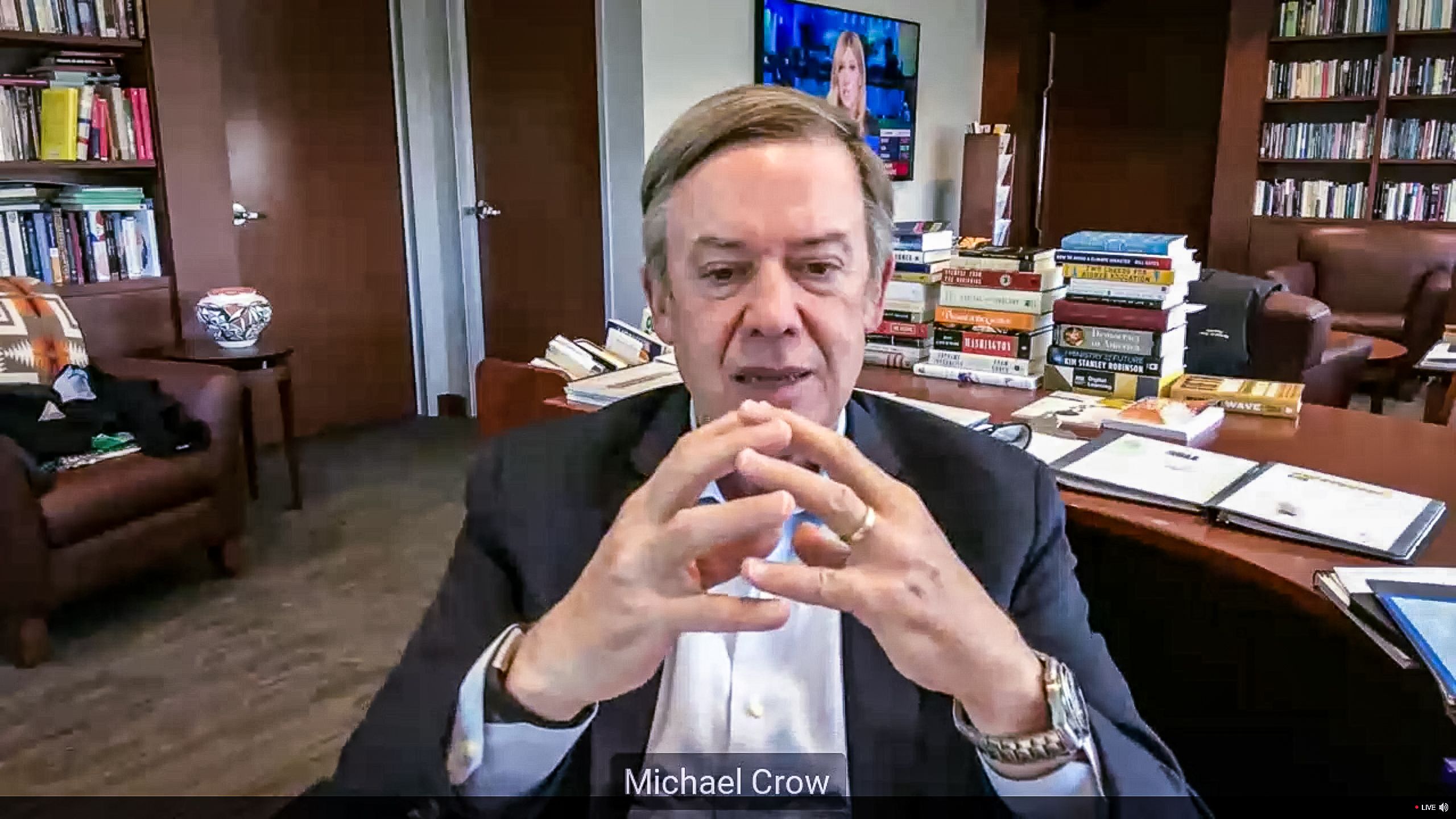Obtaining a college degree is a wonderful achievement and a life-changing event, but parents want more for their children than just landing a well-paying job, Arizona State University President Michael M. Crow said April 7 in a nationally attended livestream event for educators and policymakers.
“I have three children and five grandchildren and my wife would agree with me that I want them to have no limits to their opportunity. And I want them to not have gone through some of the stuff I’ve gone through,” Crow said, addressing a group of approximately 500 academics; federal, state and local policymakers; members of education NGOs and think tanks; and a variety of working professionals. “Parents want their children to be economically successful and they want their children to have a good life. That’s what they really want.”
Crow was the featured guest speaker in a virtual event titled “Family Voices: Building Pathways From Learning to Meaningful Work,” hosted by the Carnegie Corporation of New York and Gallup. The one-hour web discussion explored the Carnegie Corporation of New York’s Family Voice study and the core issues of pathways, barriers to aspirations and what parents want their children's postsecondary education to include.
The event panel also included Aimée Eubanks Davis, founder and CEO of Braven; LaVerne Evans Srinivasan, vice president of the National Program and program director of education for Carnegie Corporation of New York; and John White, co-founder and board chair of Propel America and former Louisiana state superintendent of education. Mohamed Younis, editor-in-chief for Gallup, handled facilitating duties.
President Michael Crow speaks with Mohamed Younis, editor-in-chief at Gallup, about research on American parents and their educational/vocational aspirations for their high-school students, in a webcast discussion, Wednesday, April 7, 2021, titled “Family Voices: Building Pathways From Learning to Meaningful Work.”
The presentation started with the results of a recent Carnegie Corporation of New York/Gallup public opinon poll of approximately 3,000 parents who were interviewed Nov. 8–Dec. 9, 2020. They were asked what they most hoped their child would do when they graduated from high school.
Younis said based on the results, parents can be divided into two fairly equal-size groups: Those who said they want their child to attend a four-year college, and those who would prefer their child do something else, such as learning a trade or joining the military. Mostly, they wanted to see more postsecondary options available to their child as well as increased opportunities to connect learning and work.
Crow believes much of the problem has to do with education itself and that the country’s university model needs to be as “democratically driven as possible.”
“It should set a standard for admission that’s related to the actual qualifications as opposed to the number of seats that you can fill, or the number of seats that you have to fill,” Crow said. “We not only have to take down the walls around the university, but take every asset that we have and make it available to any learner in the society more broadly.”
Crow said ASU students are given a personalized navigation solution that tracks their academic progress and plans their individual pathway toward a degree, providing seamless journeys from college into meaningful employment. However, there are still knowledge and information gaps for parents and family members regarding academic institutions, financial aid and pathways to employment. That too needs to be addressed, he said.
“All of that comes from thinking of higher education as a scarce commodity as opposed to an abundant commodity,” Crow said. “We’re using technology as our mechanism to empower abundance.”
Crow said learners come from all walks of life and want different things for themselves, and that universities should become less one-dimensional and more practical when it comes to preparing students for careers.
“We shouldn’t care where someone starts. Do they want to go into the military? Great. Let’s help them to be able to do that,” Crow said. “Do they want to become a carpenter or electrical worker? Great, let’s make that happen. What we don’t realize is that every one of those people, whether you go to college or whether you go to work right away are going to need learning now and going forward in this phase of our economic evolution … We need a whole new logic relative to education.”
Crow’s remarks resonated with the panel, particularly Carnegie’s Srinivasan.
“I love the way he (Crow) positioned this as a design challenge and that if we are going forward, there is a need for a new logic,” Shrinivasan said. “That’s exactly what our thinking is.”
Top photo courtesy of iStock/Getty Images
More Arts, humanities and education

ASU graduate education programs are again ranked among best
Arizona State University’s Mary Lou Fulton College for Teaching and Learning Innovation continues to be one of the best graduate colleges of education in the United States, according to the…
ASU FIDM students to see their designs on the runway at Uncertainty Fashion Showcase
Nola Hill is perfecting every stitch of her fashion design collection, which she started conceptualizing last summer.She is among 30 ASU FIDM fashion design students who have been working late into…

ASU+GSV Summit brings experts together to discuss advancements in education
Arizona State University President Michael Crow kicked off the ASU+GSV education technology summit in San Diego on Monday with a deep dive into the value of technology to address challenges in public…



